BusinessEurope Headlines No. 2019-11
President Gattaz on EU elections: “Transitions are opportunities”
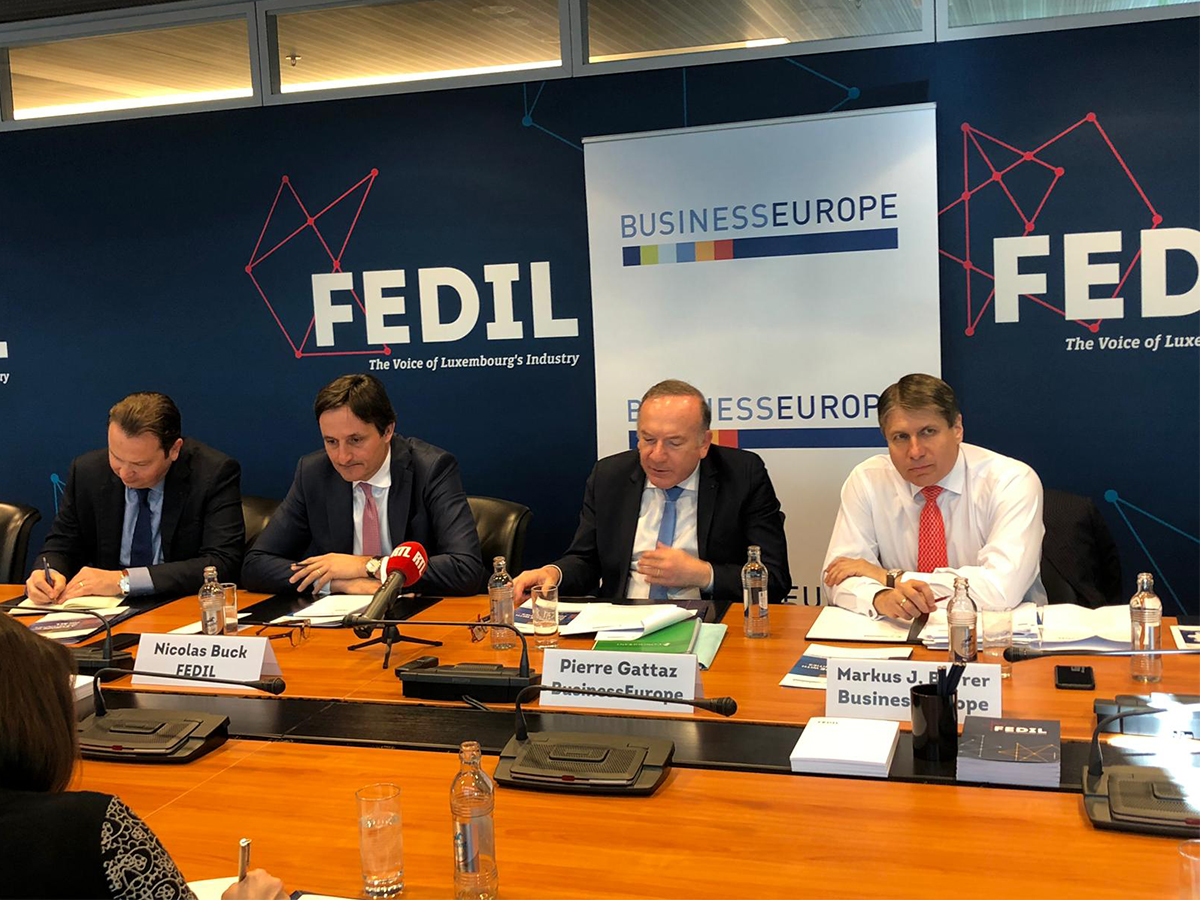
“Faced with challenges, European integration must be strengthened. Companies are committed to transforming these challenges into opportunities. Transitions are not risks but opportunities”, said BusinessEurope President Pierre Gattaz about the upcoming European elections in May 2019, at an event in Luxembourg organised by its member federation FEDIL on 21 March. After a working breakfast with Nicolas Schmit, former Minister of Labour, Employment and Immigration of Luxembourg, President Gattaz and Director General Markus J. Beyrer took part in a press conference with Nicolas Buck, Chairman of FEDIL. BusinessEurope laid out its ambition for Europe in 2030 ahead of the European elections. On the topic of Brexit, during a panel discussion with candidates of the major Luxembourgish political parties, Director General Markus J. Beyrer underlined that “we must avoid Brexit ending in a disaster. We support an extension on the basis of Art. 50 paragraph 3. This extension should be as short as possible but long enough to allow for an orderly exit”.
![]() Contact: Julia Luerzer
Contact: Julia Luerzer
Our comment
Are we prepared for Brexit?
By Luisa Santos, Director for International Relations
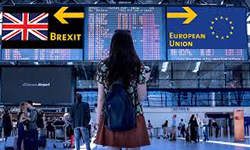 We have been discussing Brexit for the last two years: what should be included in the exit agreement, what kind of future relation the EU and the UK should have, what business should do to prepare. Regrettably this last week of March 2019 it seems we are almost back at square one.
We have been discussing Brexit for the last two years: what should be included in the exit agreement, what kind of future relation the EU and the UK should have, what business should do to prepare. Regrettably this last week of March 2019 it seems we are almost back at square one.
We know everyone wants to avoid cliff-edge and ensure a smooth exit but if there is no concrete action and we simply let the clock running this could still happen on 12 April 2019, new date for the UK's departure from the EU if the Withdrawal Agreement is not approved by the House of Commons by 29 March.
The EU has done what it could at this stage. It has facilitated an extension of article 50, it has given extra assurances regarding the withdrawal agreement, in particular the backstop. The ball is in the UK’s camp once more.
It is up to the UK to decide if it can support the withdrawal agreement that is on the table, if it wants to have more ambition regarding the future relation (the EU has said it is open to change the political declaration regarding the future EU-UK relation) or if it wants another solution that requires more time e.g. referendum, elections. We can only hope to have some clarity soon.
In the meantime, business is preparing. We were told to prepare for the worst scenario or for no deal and this is what companies have been trying to do. But this is a very challenging task.
Let’s not forget the UK has been part of the EU for more than 40 years and its market has been seen by European companies as domestic market and vice-versa. If the UK crashes out without a deal it will be the only country in the world with which the EU has no agreement. The UK will be like any other third country but without any safety network of trade or any other type of agreements - for instance on mutual recognition of standards.
Both the EU and the UK have been adopting contingency measures to mitigate the impact of a no deal Brexit. These measures are extremely important but they are limited in scope and will not have the same effect as a withdrawal agreement that includes transition with the UK staying in the customs union and the single market until December 2020. Without a deal the exit will not be smooth and we can expect disruption (link to our recent letter on contingency measures).
Even if the exit day has been pushed forward, uncertainty remains extremely high. We are living an unprecedented situation with so many possible scenarios still on the table after more than two years of negotiations.
One thing is certain, the longer it takes to have clarity on the immediate future the more companies will be forced to take decisions that will be difficult to reverse. We hope the discussions this week in the UK Parliament are conclusive and a feasible solution is found. If this does not happen, the UK must come up swiftly and until 12 April with a workable proposal on the way forward.
In the meantime, preparations for no-deal should be maintained and possibly reinforced. Companies need to adjust the plans made 29 March and set them to the new date of 12 April. We should be prepared as we can be for the worst always hoping for the better.
Contact: Luisa Santos
EU-Korea free trade agreement: how to improve implementation
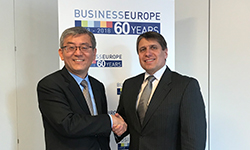 On 22 March, BusinessEurope’s Director General Markus J. Beyrer met with H.E. Kim Hyoung-zhin, Ambassador of South Korea to the European Union. The meeting offered an opportunity to discuss the bilateral relationship at large, including the implementation of the EU-South Korea free trade agreement (FTA). “The EU and South Korea enjoy a balanced trade relationship, however more could be done for example to improve the business climate and increase access to the Korean public procurement markets for EU companies”, Beyrer said. South Korea is also among the countries that together with the EU defend rules-based trade and the need to have a functioning World Trade Organisation (WTO). Another aspect discussed was the implementation of the Trade and Sustainable Development chapter of the EU-Korea agreement, in particular with regard to the respect for the International Labour Organisation (ILO) fundamental principles of freedom of association and the right to collective bargaining and the pending ratification by Korea of four fundamental ILO Conventions. In December 2018, the European Union formally requested consultations with the government of the Republic of Korea, marking the first time the EU ever initiated the dispute settlement mechanism under a Trade and Sustainable Development Chapter of a free trade agreement.
On 22 March, BusinessEurope’s Director General Markus J. Beyrer met with H.E. Kim Hyoung-zhin, Ambassador of South Korea to the European Union. The meeting offered an opportunity to discuss the bilateral relationship at large, including the implementation of the EU-South Korea free trade agreement (FTA). “The EU and South Korea enjoy a balanced trade relationship, however more could be done for example to improve the business climate and increase access to the Korean public procurement markets for EU companies”, Beyrer said. South Korea is also among the countries that together with the EU defend rules-based trade and the need to have a functioning World Trade Organisation (WTO). Another aspect discussed was the implementation of the Trade and Sustainable Development chapter of the EU-Korea agreement, in particular with regard to the respect for the International Labour Organisation (ILO) fundamental principles of freedom of association and the right to collective bargaining and the pending ratification by Korea of four fundamental ILO Conventions. In December 2018, the European Union formally requested consultations with the government of the Republic of Korea, marking the first time the EU ever initiated the dispute settlement mechanism under a Trade and Sustainable Development Chapter of a free trade agreement.
Contact: Eleonora Catella
Trade plays a key role in strengthening EU’s competitiveness
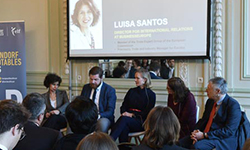 Luisa Santos, BusinessEurope’s Director for International Relations Department spoke at the Ralf Dahrendorf Roundtable on “Taking Charge of Transatlantic Trade”, organised by the European Liberal Forum at the BELvue Museum in Brussels on 21 March. European Commissioner for Trade Cecilia Malmstrom, Member of the European Parliament Marietje Schaake and Professor André Sapir, Senior Fellow at Bruegel, were also on the panel and debated what the EU can do to develop a more proactive approach towards transatlantic trade and to maintain constructive trade relations globally. Santos highlighted that the European Union must continue to engage with the U.S. and China, and ensure that rules for international trade are fit for purpose. “We also need to create conditions for European companies to be competitive both globally and at home. By having an ambitious bilateral trade agenda, we are creating a large network of like-minded partners that believe in rules-based trade, while setting rules that uphold European standards and support the competitiveness of European companies,” she stated.
Luisa Santos, BusinessEurope’s Director for International Relations Department spoke at the Ralf Dahrendorf Roundtable on “Taking Charge of Transatlantic Trade”, organised by the European Liberal Forum at the BELvue Museum in Brussels on 21 March. European Commissioner for Trade Cecilia Malmstrom, Member of the European Parliament Marietje Schaake and Professor André Sapir, Senior Fellow at Bruegel, were also on the panel and debated what the EU can do to develop a more proactive approach towards transatlantic trade and to maintain constructive trade relations globally. Santos highlighted that the European Union must continue to engage with the U.S. and China, and ensure that rules for international trade are fit for purpose. “We also need to create conditions for European companies to be competitive both globally and at home. By having an ambitious bilateral trade agenda, we are creating a large network of like-minded partners that believe in rules-based trade, while setting rules that uphold European standards and support the competitiveness of European companies,” she stated.
Contact: Eleonora Catella
Photo copyright: European Liberal Forum
Stepping up capacity building support to national social partners
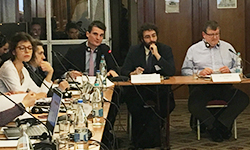 “Social dialogue implies industrial relations models in which social partners can autonomously exercise their practices of collective bargaining. In the future, a key factor to encourage enterprises and their organisations to invest in social dialogue is to ensure that it positively contributes in terms of competitiveness. This seminar was useful for participating social partners to exchange information and learn from each other, including in relation with their involvement in the European social dialogue”. These were the main messages given by BusinessEurope Social Affairs Director Maxime Cerutti at the end of the cluster seminar on “Reinforcing the EU social dialogue and industrial relations”, organised by the European social partners in Bucharest on 21 March 2019. This seminar brought together social partners representatives from Romania, Germany, Italy and Malta.
“Social dialogue implies industrial relations models in which social partners can autonomously exercise their practices of collective bargaining. In the future, a key factor to encourage enterprises and their organisations to invest in social dialogue is to ensure that it positively contributes in terms of competitiveness. This seminar was useful for participating social partners to exchange information and learn from each other, including in relation with their involvement in the European social dialogue”. These were the main messages given by BusinessEurope Social Affairs Director Maxime Cerutti at the end of the cluster seminar on “Reinforcing the EU social dialogue and industrial relations”, organised by the European social partners in Bucharest on 21 March 2019. This seminar brought together social partners representatives from Romania, Germany, Italy and Malta.
Contact: Jessie Fernandes
Circular economy: crucial role for digitalisation and consumer engagement
 “Active citizen and consumer engagement are important ways to create a functioning circular economy and market for secondary raw materials in Europe. Digitalization will have a significant role to play”, said BusinessEurope Environment and Climate Advisor Leon de Graaf at an event organized by the European Policy Center (EPC) on 28 March on how to facilitate the transition to a digitalized circular economy. De Graaf highlighted that digitalization can help companies move to business models that generate revenues on monitoring, repairing and upgrading the performance of products, rather than just generating revenues at the point of sale. Smart packaging and other waste streams will be able to communicate with next-generation waste management systems to robotize collection and sorting. He added that “the next EU political cycle will be important to help make a success of some achievements in digital legislation for circular economy, for example regarding the free flow of data and online data platforms. Business is already doing a lot and will continue to work with policymakers to raise awareness, provide transparency and improve consumer engagement with the circular economy”. For examples on how European business adds to the circular economy, please visit the Circular Economy Industry Platform.
“Active citizen and consumer engagement are important ways to create a functioning circular economy and market for secondary raw materials in Europe. Digitalization will have a significant role to play”, said BusinessEurope Environment and Climate Advisor Leon de Graaf at an event organized by the European Policy Center (EPC) on 28 March on how to facilitate the transition to a digitalized circular economy. De Graaf highlighted that digitalization can help companies move to business models that generate revenues on monitoring, repairing and upgrading the performance of products, rather than just generating revenues at the point of sale. Smart packaging and other waste streams will be able to communicate with next-generation waste management systems to robotize collection and sorting. He added that “the next EU political cycle will be important to help make a success of some achievements in digital legislation for circular economy, for example regarding the free flow of data and online data platforms. Business is already doing a lot and will continue to work with policymakers to raise awareness, provide transparency and improve consumer engagement with the circular economy”. For examples on how European business adds to the circular economy, please visit the Circular Economy Industry Platform.
Contact: Leon de Graaf
Calendar
- 2 April: 23rd European Corporate Governance conference
- 3 April: 5th European Migration Forum
- 3 April: Launch of BusinessEurope's Thanks to Europe video
- 4 April: 70 years of NATO
- 4 April: Eurogroup
- 9 April: EU-China Summit
Reminder: please take a look at our revised privacy policy